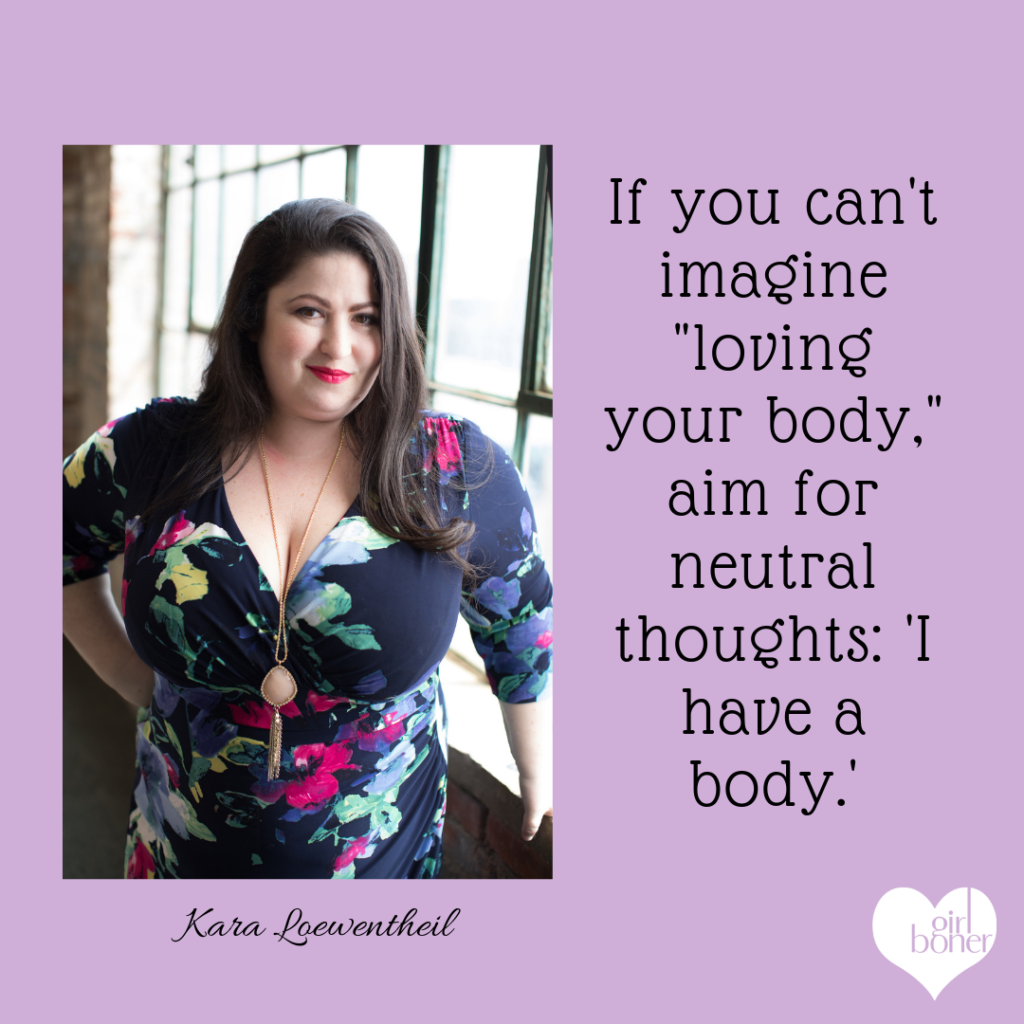Do you ever find yourself thinking more about your appearance more than your own pleasure during sex? Or feel increasing pressure as time ticks by, wondering when you’ll finally reach orgasm?
I loved exploring common orgasm-blocking thoughts and ways to work around them with Kara Loewentheil, a feminist confidence coach and host of the podcast Unfuck Your Brain on Girl Boner Radio. Kara is a wealth of knowledge and has a gift for making solutions for seemingly complex issues feel light and practical. After our chat, I shared a fun assignment that might be just the fix you need in the O department.
Stream the full episode on Apple Podcasts, iHeartRadio, Spotify or below! Read on for a few of my favorite takeaways.
3 Common Orgasm-Blocking Thoughts — And What to Do About Them
1 “I’m too fat/skinny/wrinkly/fill-in-the-blank.”
Numerous studies and lots of anecdotal evidence show that negative self-talk about our bodies can interfere with many aspects of our lives, our sexuality included. Findings published in the International Journal of Eating Disorders, for example, linked positive body image with comfort undressing before a partner and having sex with the lights on.
If we focus on perceived flaws in our appearance, it’s extremely difficult to relax. This is important, seeing as relaxation sets the stage for arousal and all-things-orgasmic.
“There are so many intersecting forces…but people who are socialized as women are taught to think about food and their bodies like every five minutes for their whole lives,” said Kara, who suggests “baby step thoughts” as a powerful way to start turning things around.
“They’re not inspiring enough to be on an Instagram post, but they actually will help them,” she added. “So if your thought about like your stomach is, ‘My stomach is disgusting, I have to hide it,’ it would be great if you went immediately to thinking ‘I’m a beautiful goddess,’ right? But most people can’t jump that far, so they just give up. I really recommend practicing thoughts like, ‘This is the human stomach.’ Just like very neutral descriptions.”
Another powerful step? Looking for images that look more like you than so-and-so or society’s depictions of sexy or beautiful. In particular, Kara recommends looking at photos of naked bodies that look like yours.
“One of the few phenomenons of body image that we have studied is that visual exposure to traditional mainstream media with unrealistic body types promotes body dissatisfaction and that visual exposure to real people’s bodies and bodies that look like yours promotes visual satisfaction,” she said.
2 “Is my partner experiencing enough pleasure?”
At the heart of this pleasure-stifler often lies worry about personal insufficiency: concern over whether we’re “good enough.” And if you’ve been socialized as a woman or to people-please to the max, this mindset is easy to slip into regardless.
Kara hears these types of concerns a lot in her community, most of whom into these categories. Folks report angst around a person going down on them, for example, because they feel so uncomfortable receiving pleasure.
“I think some of us are raised to believe that we are entitled to pleasure,” she noted. “And that can be toxic masculinity run amok, the idea that you’re entitled to pleasure regardless of what the other person wants. But then the flip side of it is not believing that you’re entitled to pleasure at all. And that even if someone’s trying to give it to you, you shouldn’t take it or your pleasure’s not important or it’s more important that they’re pleased and you’re worrying if they’re pleased that you’re pleased.”
If you relate to this orgasm-blocking thought, Kara recommends reminding yourself that receiving pleasure is giving your partner pleasure.
“In a good sexual relationship, at least, very rarely is one person doing something that they’re like, ‘This is about equal to filing my taxes, but I’m just doing it for the other,’” she said. “If they’re not into that particular act, they’re still doing it because they think it’s sexy when you’re excited, or they want to give you that experience.”
3 “My orgasm is taking too long.”
Here’s one sure way to make orgasms less likely: stress over how long it’s taking you to get there. And the more we stress, the longer it takes.
While we probably can’t snap our fingers and stop stressing pronto, we can give ourselves permission to enjoy the process, seeing orgasm as what Dr. Shannon Chavez said in our Skirt Club chat, as a side effect of great sex.
Secondly, remind yourself that there is no “good,” “right” or “ideal” time amount for getting to the point of orgasm—even if your partner gets there far faster. The more arousal we allow and savor, the more pleasure we’ll experience leading up to and during climax. In other words, the journey there can be just as juicy, if we give ourselves that grace and freedom.
It’s also 100 percent okay to set orgasm as a primary goal of sex at times, whether you’re playing solo or with a partner. When this is the case and you want to speed things up, consider the homework assignment I suggested at the episode’s end. You and your Girl Boner are worth it.
For much more on this topic, stream the full episode above or on your favorite podcast app! Join Kara’s feminist coaching community here.


This is oh so important especially for those unsure of themselves in every way. Great to see you continuing with your postings. I still wear my “banned” t shirt
On a side note for, perhaps, another episode (maybe even with Kara – one of my most fav names!): I suffer from an inability that ranges from a short-lasting erection to, perhaps, none at all this time. It is, mostly, due to my diabetes, though this article gave me some thoughts, too.
Could you, perhaps, talk about how to overcome this predicament and enjoy and look forward to sex?
This is so spot on. I would love to get to the psychology behind why us women think like this. I am in a secure long term relationship. As far as intimacy goes, we are great but I will find myself going through periods where I am insecure, lights off and all the above and have no idea why. I will work through it and be good for a while but always come right back.
I am definitely guilty of all three but #1 hits home for me.
It has taken me years to start loving my body. I have two kids and my stomach looked like it. I was insecure for years about it. It is interesting what our perceptions of reality can be because during my insecurity all I saw were fit girls with perfect washboard abs.
After a decade, I decided to have an abdominoplasty. I don’t regret it but something interesting happened. The mobs of hot girls that were always around in my mind, didn’t exist. I distinctly remember being at the beach post tummy tuck and looking around at other woman and a majority had the stomach I just paid 7k to change. Somehow I was fixated on the few women I saw that had my “ideal” body type and overlooked reality.